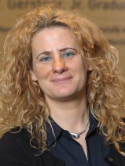Analysis of disparities in time to allogeneic transplantation in adults with acute myelogenous leukemia Journal Article
| Authors: | Fingrut, W. B.; Gyurkocza, B.; Flynn, J.; Davis, E.; Devlin, S.; Scaradavou, A.; Chinapen, S.; Quach, S.; Cho, C.; Giralt, S. A.; Jakubowski, A. A.; Lin, R. J.; Papadopoulos, E. B.; Perales, M. A.; Ponce, D.; Shaffer, B. C.; Tamari, R.; Young, J. W.; Politikos, I.; Barker, J. N. |
| Article Title: | Analysis of disparities in time to allogeneic transplantation in adults with acute myelogenous leukemia |
| Abstract: | Although alternative donors extend transplant access, whether recipient ancestry affects the time to allogeneic transplant is not established. We analyzed the likelihood of clinically significant delays to allograft by patient ancestry in 313 adult patients with acute myelogenous leukemia (AML) who underwent transplantation. Non-European ancestry patients (n = 99) were more likely than Europeans (n = 214) to receive HLA-mismatched donor allografts (45% vs 24%). Overall, the median time from transplant indication to allograft was 127 days (range, 57-1683). In multivariable analysis, non-Europeans had an increased risk of prolonged indication to transplant time >180 days owing to significant delays in indication to consult >90 days and consult to transplant >120 days. Compared with recipients of HLA-matched unrelated donors (URDs), HLA-mismatched adult donor recipients were at an increased risk of delayed indication to transplant, whereas HLA-identical sibling and cord blood recipients were at a lower risk. Subanalysis showed more indication to transplant delays >180 days in non-European (44%) vs European (19%) 8/8 URD recipients. Finally, the pandemic further exacerbated delays for non-Europeans. In summary, although non-European patients with AML are less likely to receive 8/8 URDs as expected, if they do, their transplants are delayed. HLA-identical siblings and cord blood facilitate the fastest transplants regardless of patient ancestry, whereas other adult donor transplants are delayed. Strategies to mitigate referral barriers, hasten donor evaluation, and use all alternative donor sources are critical to ensure timely transplantation for patients with AML. |
| Keywords: | ethnicity; hematopoietic-cell transplantation; stem-cells; bone-marrow-transplantation; access; availability; cord-blood transplantation |
| Journal Title: | Blood Advances |
| Volume: | 7 |
| Issue: | 15 |
| ISSN: | 2473-9529 |
| Publisher: | American Society of Hematology |
| Date Published: | 2023-08-01 |
| Start Page: | 3824 |
| End Page: | 3833 |
| Language: | English |
| ACCESSION: | WOS:001059739800001 |
| DOI: | 10.1182/bloodadvances.2022008572 |
| PROVIDER: | wos |
| PMCID: | PMC10393759 |
| PUBMED: | 36240477 |
| Notes: | The MSK Cancer Center Support Grant (P30 CA008748) is acknowledged in the PDF -- Corresponding author is MSK author: Juliet N. Barker -- Source: Wos |
Altmetric
Citation Impact
BMJ Impact Analytics
MSK Authors
Related MSK Work






















